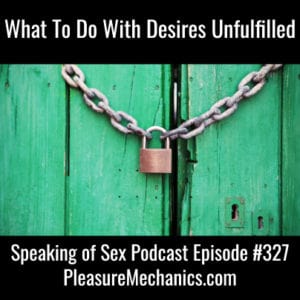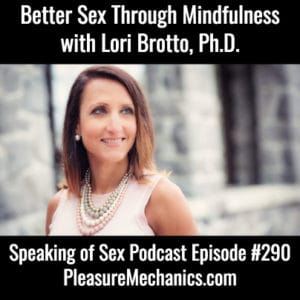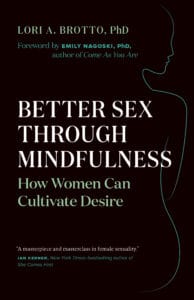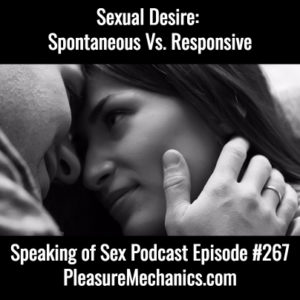Podcast: Play in new window | Download
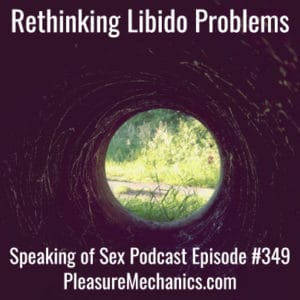
Low libido? Loss of libido? Crazy high libido? Mismatched Libido? There are 99 libido problems out there, and many people report struggling with their libido. Libido troubles are one of the leading reasons people seek out the advice of a sex therapist or tune into sex podcasts like this one. But it is time to rethink libido, debunk libido myths and start talking about the truth about human libido: that it is mysterious, fluid and contextual.
If you are struggling with libido troubles, tune in and start rethinking what your sex drive means and what your relationship to your libido can look like over time.
Ready for more?
Listen to our episode about Surviving Sexless Seasons
Read more from Emily Nagoski on why there is no such thing as a sex drive.
Ready to master new erotic skills? Check out our online courses and use the code SPEAKINGOFSEX for 20% off the course of your choice.
Podcast Transcript for Episode 349: Rethinking Libido Problems
Podcast transcripts are generated with love by humans, and thus may not be 100% accurate. Time stamps are included so you can cross reference or jump to any point in the podcast episode above. THANKS to the members of our Pleasure Pod for helping make transcripts and the rest of our free offerings happen! If you love what we offer, find ways to show your love and dive deeper with us here: SHOW SOME LOVE
Chris Rose: 00:01 Welcome to Speaking of Sex with the Pleasure Mechanics. I’m Chris.
Charlotte Rose: 00:05 I’m Charlotte.
Chris Rose: 00:06 We are the pleasure mechanics. And on this podcast, we have soulful and explicit conversations about every aspect of human sexuality. Come on over to pleasuremechanics.com where you will find our complete podcast archive. And go to pleasuremechanics.com/free to get started with our free online course, The Erotic Essentials. That’s pleasuremechanics.com/free to get started. And if you love this show and want to support the work that we do, go to pleasuremechanics.com/love. And you’ll find ways to show us some love and support so we can keep doing the work that we do. Hey you.
Charlotte Rose: 00:51 Hey.
Chris Rose: 00:52 Hey.
Charlotte Rose: 00:52 I was like, are you talking to me or the people?
Chris Rose: 00:57 You’re the only one in the room, baby. So Charlotte and I are luxuriating right now because our daughter just started kindergarten. So our one and only child just started full time school for the first time, and we are thrilled.
Charlotte Rose: 01:15 Yeah, this feels like absolutely a game changer, and it feels kind of amazing.
Chris Rose: 01:20 Last year was great because she was in part-time school, but kind of after pickup and drop off, it was a little bit like we got a blip of the day. This feels like we get the whole day.
Charlotte Rose: 01:29 So we’re so excited to make more stuff for you.
Chris Rose: 01:35 Watch out. But it also, I think what we’re noticing and it leads right into the theme that I want to talk about today is we are only … this is day three, we’re only a couple days into it, and we’re noticing the tremendous energetic shift. And the shift of how we are able to place our attention, what kind of container our day can become. And how dynamic life is, just how changeable life is. Because I feel like we’re in a whole new phase now. Okay, onwards.
Chris Rose: 02:10 And what we want to talk about today is libido, and specifically this idea of mismatched libidos. And we are launching into a multi episode exploration of this topic. I am going to call out this topic right from the beginning as the biggest problem people have that is not really a problem. Meaning it is not one problem. There is no one problem called mismatched libido. And yet, it’s become this landing place for so many people’s sexual struggles, so many people’s narratives about why they are suffering sexually. It’s like, “Well my partner and I just have a mismatched to libido.”
Charlotte Rose: 02:58 There’s a lot of pain in that for a lot of people and a lot of couples.
Chris Rose: 03:02 It’s the number one thing we hear. It’s the number one thing sex therapists report. It’s consistently the language that people use, mismatched libido, or I have a really low libido. I’ve lost my libido. If we did kind of a word scramble where libido was the topic and we had 10,000 of us in a room together, what are some of the things you would be shouting out? Right? Because when we think about libido, it’s either I have a really high libido and that’s a problem. My low libido is a problem. My partner has a high libido. We project a lot of problems onto this word libido. And we don’t even know what it means. As I say it again and again, libido. It’s like, what does libido mean?
Chris Rose: 03:50 One of our favorite sex science writers Emily Nagoski reports, there is no such thing as a human sex drive. How does it feel to hear that? What does that mean? And what is our experience of this concept of libido, sex drive, interest in sex? And how do we change our relationship to it if we want to?
Chris Rose: 04:16 Those are the framing questions we want to go into the next few episodes with. Because we are going to be bringing on some guests, some sex therapists to talk about libido. But I do not want to go into this conversation with any assumptions intact. I wanted to do this framing episode, especially after last week’s conversation. So last week we hosted Dana B. Myers, and we were talking all about sex as parents. And next week, we’re going to be hosting sex therapist Vanessa Marin, who is brilliant and wise, and is offering a new course on libido called The Passion Project. All about bringing your relationship to libido more in alignment with your partners.
Chris Rose: 05:03 So we’re kind of sandwiched in between these two really important conversations that are so much the sandwich of life we are in now, Charlotte. Charlotte and I are emerging out of this long season, not only of being new parents, but of my illness. Of dealing with ill parents, of just a lot of life changes. So our relationship to this concept of libido is dramatically changed over the past decade of our life. And we want to report from that place too and really introduce the concept that this is not a fixed identity. You are not a high libido person, or a low libido person. Because both of us have been both of those things at different times, even just within the container of our relationship.
Chris Rose: 05:50 So let’s explore this. Let’s explore libido together with curiosity, with the willingness to pull apart assumptions. But really also with an honoring. And Charlotte, you were very insistent upon this as I was getting kind of rebel rousing, planning this episode. Of honoring the pain and the struggle that are in this pool with us and in this experience of our relationship to libido.
Charlotte Rose: 06:20 So what is libido? How do we define it? We have the cultural idea of what that is, but let’s dive in and really explore what does it mean.
Chris Rose: 06:29 Well, it doesn’t mean anything and that’s part of the problem. Part of the problem with this whole conversation and why I get so fired up about this is because we have to address it. And sex therapists like Vanessa Marin have to build courses about it, because it’s how people understand their sexual struggles.
Charlotte Rose: 06:47 But.
Chris Rose: 06:47 But the idea of libido, most people if I asked what does libido mean? It’s like well, it’s your sex drive. It’s how much you’re interested in sex. So there’s no such thing as a sex drive in the human animal. And Emily Nagoski does a great job explaining this. Physical drives are drives for things that if we did not have them, would cause us to perish. So the drive around hunger and thirst is a motivational system that activates when our need for food or water becomes life threatening. And all of our behavior becomes oriented to satiating that need.
Chris Rose: 07:30 This was extended into this concept of sex drive. But humans don’t have a sex drive. If you don’t have sex, it will not kill you. There is perhaps a metaphorical perishing of your DNA. But that’s just a story. That’s a concept. That’s a cultural idea.
Chris Rose: 07:50 So what we need to do is get rid of an idea that there is any one thing that is a healthy sex drive. Because what happened is this idea of sex drive got invented in the psychoanalysis field, and it got kind of popularized. So if people have a sense that there is this thing called the sex drive that we are supposed to have, and it is supposed to act a certain way. And if it is not acting that way, it means you are broken
Chris Rose: 08:21 And yet there is no agreement, there’s no medical agreement about what that sex drive is supposed to look like. And there’s also no truth telling about the reality that this interest in sex and the interest in desire … okay wait. Okay. I’m getting ahead of myself. Okay. So libido does not exist. It is not a thing in the human animal, like our need for food and water.
Charlotte Rose: 08:47 Not to diminish that some people may experience an urgency and a necessity of sex. But that is not a sex drive.
Chris Rose: 08:56 So what can we agree on here? So we can agree on there is this confluence of factors that dictate individual’s interest, desire, and attention towards sexuality at any given time in their life. So some people are what we would, if we want to call that libido for short, fine. Let’s call libido the confluence of your energy, interest, availability for, and desire for sexual expression, right? That’s a mouthful.
Chris Rose: 09:32 So if we think about libido as interest in desire and sexuality, then we have to ask interest and desire for what? Because most of the clinical understandings, most of the “science” around libido studies PIV. Penetration, penis in vagina sex. And that is not the barometer of sexual expression. We know this. We know that that is not the only way humans are sexual. It is not inclusive of things like masturbation, massage, cuddling, kissing, long walks while talking about your soul’s mission. All of the other ways we connect and enjoy one another. Nor things like kinky sex and how you might have interest in things like bondage and domination, but not much interest in traditional vanilla PIV at the moment.
Chris Rose: 10:28 So we need to complicate this conversation. You have sexual interest and desire in what? And all range of options there are healthy and normal. You can have just the interest in having a vibrant masturbation life, and build your whole sex life and sexual identity around that. And that can be a normal, healthy expression of human sexuality.
Chris Rose: 10:53 You can have no interest in sexual connection with other human beings, and some people would identify more along an asexual spectrum where there’s just no interest. And that can be a healthy, normal expression of human sexuality without suffering. You can live a happy, fulfilled life with no interest and sexual connection.
Chris Rose: 11:14 Some people have a passionate interest in sexuality. They think about it all the time. They want to have sex every day. Sometimes I get emails where it’s like, “I’m a high libido person, I want sex three to five times a day and my partner’s not up for it.” And it’s like if you want to do anything other than eat, and shit, and piss three or five times a day, that is a high interest in that activity, right? If you’re watching football three to five times a day, if you’re going to the gym three to five times a day, if you’re doing anything three to five times a day, that is really intense high interest in my book.
Chris Rose: 11:53 Other people would say, “I’m a really high libido person. I want sex once a week.” And the idea of having sex once a week. So this ties into our idea of sexual frequency and what is normal there. And after decades in this field, I am here to tell you there is no normal there. For some people, a wonderful pace of sex would be cuddling every night, and then having a longer session two to three times a month. And that would feel great. That would feel like a fulfilling, full, satisfying sex life. Other people are deep in suffering and struggle because they are not having intercourse every day.
Chris Rose: 12:36 So what do we do with this? And okay, interest in what? Complicating the interest in what question and knowing that there’s so many ways of expressing your human sexuality. Normalizing that there are so many ways to be interested in sex and levels of interest, and that those are all normal and healthy. It is not healthier to be higher libido or lower libido. Nor are you happier if you are higher libido or lower libido. Because I hear both tales of fulfillment and tails of struggle from both ends of this spectrum.
Chris Rose: 13:18 And, we have to recognize that individuals change within this spectrum, travel within this spectrum, multiple times throughout their lifetime. And in context to what else is going on in their life. Charlotte and I have both been high libido people who have organized our life around sex. Those were the days. Those were wonderful days, and it made sense in the context of the rest of our life and who we were as people at the time. We have both been people with almost no libido, and been completely happy and content. Some of the happiest times of our life were our lowest libido times. And also some of the scariest, right? Like when I was sick. And that was a different reason to be low libido. My body was barely surviving. There’s no room for sex in that. There was room for affection, and touch, and all of these things. But when we were with our infant and our days were full of cuddling that tender newborn, and I was bringing Charlotte chia pudding trays with flowers and tending to her every need. Those were some of the most deeply erotic, connected moments of our life. And they had nothing to do with our genitals. Well, I was tending to your genitals. Your genitals had a different function at that time. Right? So this is changeable. This is changeable.
Chris Rose: 14:52 And what I am seeing is the suffering is in the stuckness. The suffering is when we get into these places, especially in longterm relationships. Because let’s face it. In short term relationships, if your sex life goes haywire, you can break up. It’s an easier time to just exit. Your context changes and one of you is out the door. In a longterm relationship when libido changes, when your context changes and your relationship to sex radically shifts, so much of the suffering is A, getting stuck in that place and believing it will never change again.
Charlotte Rose: 15:30 And in the story and what you make it mean about what the situation is.
Chris Rose: 15:35 Right. Say more about that because I think that is exactly it. It’s the story around our sex drive, the story of our libido.
Charlotte Rose: 15:44 If you have a low libido and you feel like there is something wrong with you and that you should be feeling more of something. And you don’t because at some level you’re a failure or you are not enough. Those stories can really take up a lot of emotional energy, and you can really believe them to be true. And they kind of grip us, and we do stay stuck in that. And that can be not helpful.
Charlotte Rose: 16:12 Equally, if you are a high libido person and your partner doesn’t want to have sex as much as you, you can make that mean that you are not desirable if you did X, Y, or Z that would want to have sex more. So again, it’s about your lack of worthiness, your lack of attractiveness, your lack of skill. And it becomes all about lack. Your lack of masculinity or femininity. It goes on and on. We all have our own specific iteration of these stories, and it’s so important to look at them because culture repeats these. So we relate to these stories as if they really are true. So take a minute and think about your own relationship to your interest in sex. Now in this current moment in your life, in the past, how does your partner, how do you think of your partner’s relationship to their interest in sex, and how are you guys talking about it together? What is your story of your relationship’s sex interest?
Chris Rose: 17:17 And this is so much of it, right? Is being honest about your narratives, about your sexuality. And painting that picture really explicitly for yourself so you kind of have it externalized and can look at it more honestly. And then how does your interest in sex interact with your partners? And when I dig into this with people, often there is this arc where there’s something in the poly community called new relationship energy, NRE. And it’s such a predictable pattern that the community gave it a name. And NRE is that lusty phase in the beginning of a relationship where you can’t seem to get enough of each other. You don’t want to take your hands off of each other. If you could stay in bed all day, you would. When you’re not with each other, you’re thinking about each other. It is a surge. It is a bonding. It is a chemical intoxication that humans do really well. Right? It’s one of the beautiful, pleasurable experiences of sexuality that we should revere and celebrate. When you meet someone and there’s sparks between two people at the same time and you’re both in that NRE, it’s wonderful. It doesn’t last, but it’s wonderful.
Chris Rose: 18:37 And we then set our benchmark kind of high because we think my sexuality has been met by this person’s, and we see each other, and we like each other, and we get into each other. And also to note, this isn’t always the case. Some people have different kinds of sexual chemistry that take a while to brew, and there’s nothing wrong with that.
Chris Rose: 18:58 But when we have a certain expectation of what our sex lives will look like for the long haul, and then it changes, people start developing very specific stories about why it changed. “I let myself go and I gained 10 pounds.” And it’s like the partner doesn’t even know what you weigh. They’re not aware of that at all. In your head, you’re projecting your insecurities, your vulnerabilities. The places you have been shamed about sexuality will become the culprits of why your libido is changing.
Chris Rose: 19:35 Likewise, if your libido shifts again within a relationship and all of a sudden you have a surge of sexual energy, sometimes that creates a crisis because you don’t know why you’re suddenly feeling this and maybe you’re not even feeling it directed towards your partner. And you have to navigate all of a sudden having more sexual energy and interest than your partner can hold. Or perhaps, life events happen and you are on different contexts all of a sudden. I say on, you’re in different contexts, but I’m almost visualizing these as islands sometimes. Sometimes this is the birth of a child, and the unequal, physical, and emotional burden and lifestyle burden means one partner is still pretty interested in sex and still feels pretty autonomous, and is ready to have a sex life. And the other partner is like on a different planet island. It’s like they are out at sea and you’re not even talking to one another anymore.
Chris Rose: 20:38 Or it’s a physical illness. One person’s energy is gone and the other person is still pretty healthy, and there can be a feeling of abandonment and betrayal in that because it’s like this is not what I signed up for? What do I do with my libido now when you’re totally unavailable to meet me? Still love you, still want to do life with you. But where the hell are you in bed?
Chris Rose: 21:02 And other times, it’s a slow drift. Resentment, anger, separation, distance come up. And you find yourself, this I visualize as you are on the same path and then started kind of wandering. And the woods get thicker, and then you find yourselves on very different paths in the same woods. And you’re kind of trying to communicate, but there’s all this shit between you and brambles. “Where are you baby? I’m over here. I still love you.”
Chris Rose: 21:30 So you may find yourself in one of these patterns. These are the patterns. I see every single day in my inbox. And they are all stories of shifting sexual contexts. And we are reminded that our interest in sex, our availability for sex, that feeling of like I want to get naked and roll around with someone, and fuck, and be fucked. And that interest, desire, whether it is spontaneous or responsive, that interest, desire, availability for sex changes so many times over our lifetime. And if you’re in a relationship with one or more people, your changes are not always going to sync up. So what do we do with that?
Chris Rose: 22:16 We did a big episode about this called Surviving Sexless Seasons that we’ve gotten so much amazing feedback around, because I think we are truth telling about something we all know here. So part of the question is how do we get out? How do we get into a new season when we want to? Because if you are suffering and you are looking at your libido, your interest in sex as a point of suffering, then there are strategies. There are things we can identify to start easing that suffering and start giving you what you need when we are specific about what we need, when we say I need more sex. Or I need you to pressure me less for sex. What do we mean in those statements? What do we mean when we talk about libido? What are we actually talking about? And if we get specific there, I believe our suffering can be lessened. So that’s what I think what we want to do in these few episodes. Is get really fricking specific about where the suffering is, where it comes from, and what we can do about it.
Charlotte Rose: 23:22 And acknowledge that everyone in relationship has high and low interest for a variety of different qualities or experiences, and that those were important and should be paid attention to also.
Chris Rose: 23:37 Say more about that. Because it’s so true when we say high desire for sex. When we look at what we’re desiring, very few are like, “I have a desire to put my penis in a wet, moist, hole. That is what I want.” Or, “I want my hole filled with a penis.” And if we’re breaking sex down, and I say it in those voices. But that is what the science does is it boils sex down into penis, vagina intercourse. And that is not the meaning of sex in our lives.
Chris Rose: 24:09 So when you say you have a higher low interest in sex, and you might surprise yourself here because you might think you’re a low libido person. And when we start talking you’re like, “Yeah I want more of that, I want more of that.” So high or low interest in what of the following qualities?
Charlotte Rose: 24:26 Connecting, which I think of as chatting and talking about things that are non plan related. Not about your kid, not about your business, but about life and interests. And just spending time talking and being with one another.
Chris Rose: 24:42 That’s emotional, affectionate connection. And then another need might be physical affection, touch. For so many of us, sex is the only event where we get a lot of our skin touched. We’ve talked about touch hunger. And the interesting thing here is this is actually one of the only places the science is very clear, is that the human body wants and craves affectionate, meaningful touch from other humans. Or from other mammals. Some people like pets, but affectionate touch. So is part of your high interest in sex just a craving for more touch? Or are you a low libido person who actually has a high interest in nonsexual touch? Massage, affectionate touch, cuddling. What’s another one?
Charlotte Rose: 25:34 Some people have a really high need for heartfelt, emotional connection. Whether it’s you’re being seen, you’re being heard, you’re being held. It is separate from sex. It can be a unique experience that is separate from sex, but often we mash it up with sex. We think of it, it’s a place people access that experience through sex often. But it can be a separate experience.
Chris Rose: 25:59 Right. If sex is the only path you know to get to that place of deep intimacy where you can feel naked, and raw, and vulnerable, and still feel held and safe in someone else’s gaze? Then yeah, you might have a high interest in sex to get there. And if we can identify other ways of getting there, that can feel like a good alternative sometimes.
Chris Rose: 26:23 Other people go to sex for stress relief, and they want to have a hot and sweaty sex session because they crave that physical release and the bestial expression that it allows. When I’m working with these people, sometimes the solution is taking up like martial arts or dance where you can power out a session or weightlifting. Another experience, or hiking up a mountain if you’re a nature person. Something where you can really go for it, lay it all out there, and end in a hot, sweaty, breathless mess.
Charlotte Rose: 27:01 Having physical cathartic experiences. It makes sense. It’s a physical need. So find other ways of doing that.
Chris Rose: 27:08 For some people.
Charlotte Rose: 27:09 For some people.
Chris Rose: 27:11 For other people, sex is an experience of being able to relax. And it’s how they get to the place of being able to drop their to do list, and focus on sensuality, and relax. So what they’re longing for and what they’re craving for is to take more time to do that. But they only give themselves permission to do that if they have a partner and the romantic context of sex to give themselves space and time.
Chris Rose: 27:36 So you can see what we’re going for. It’s like when we start thinking about our interest and desire for this capital S sex, this category of human experience. And we can start being specific about what we’re longing for, what we’re needing more of in our life. And then we get realistic about our situation.
Chris Rose: 28:00 Do you have a partner that’s available to assist you with that or not? Because sometimes and often, the answer is no. I have this longing and craving. Sex would be a delightful way to get that met. But that is not available to me at this moment for some reason, whether or not you’re in a relationship.
Chris Rose: 28:20 And I want single people to hear this, that there are a lot of people in relationships that feel very alone and lonely in their sexuality. Having a partner does not guarantee you a sex partner. And I want people in relationships to also hear that they are not alone if you’re in a relationship and feeling lonely. This is very common.
Chris Rose: 28:41 So whether or not you’re in a relationship, whether or not you have a life partner. If you don’t have a sex partner to meet some of these needs, to meet some of these desires, then we can start mapping other ways to start filling in those longings.
Chris Rose: 28:59 Like we said, if you are someone who loves getting hot and sweaty, and fucking until you’re panting for breath, and you see yourself in that statement, and that is not available to you, you can spend your life sexually frustrated. Or you could go master another skill using your body, using some of that same energy. Or bring that same energy into your masturbation practice, accessorize so you have something to penetrate and fuck or you have … they have amazing devices now for any kind of physical experience you want out of sex. You can kind of create for yourself. And that can be meaningful. It’s not the same. And sometimes I get in these email loops with people and it’s like, “Yeah, but yeah,” but it’s like, yes. Sharing sex with another human being is a beautiful, special experience that cannot be replicated. But the needs, wants, desires, physical experiences and expressions of sex are myriad. They’re so numerous, and there’s so many ways as humans we can be creative in expressing these things, filling these needs.
Charlotte Rose: 30:13 But it does involve being honest with yourself about what you long for, what you crave, what you desire. And giving yourself permission to find a way to make a plan to give that to yourself. So there’s acknowledging the truth within yourself, giving yourself permission, and then getting creative about how you can fulfill those needs and desires within whatever your circumstance is. So if that’s solo, if that is partnered, if that is any other option.
Chris Rose: 30:46 And it’s also looking, so then there’s this process that we’re talking about meeting our needs in alternative ways. But then there’s also looking at what is holding us back from creating the sex life we want. So then there’s also getting really specific about all of those things. And either alone or within your relationship, laying it all out there and being honest about, “We’re not having sex because this, this, and this. And if we can change these few factors, we could have a more satisfying sex life together.”
Chris Rose: 31:19 So next week, we are joined by Vanessa Marin. She is an amazing sex therapist. We have had her on the podcast. She’s probably our most recurring guest at this point, because she brings all of the information, and knowledge, and wisdom of sex therapy to this conversation. We’re going to be talking all about libido, what she sees in her practice, and how she approaches mismatched libido. And then she’s going to be telling you about a course she is offering now that is called The Passion Project and is really a comprehensive step by step guide through this maze for couples. To realign your relationship to your own libido, and then to get your own on track with your partners.
Chris Rose: 32:09 So we are going to talk about this, and I am going to push her with some questions about what we mean when we talk about libido. And I was thrilled when she gave us access to her course and I saw that she takes just as a multifaceted approach as we do. That this is not one conversation. It’s many to pull apart and really understand your positionality within this question of interest, and desire, and sex. And we’re going to continue the conversation. So we also want hear from you. I hear about your libidos all the time, guys, but I’m open to hearing about it now specifically. What are your struggles, what are your questions? Especially after you heard us just kind of explode this idea of mismatched libidos being a problem. I hope we recognized that this is a very common language for our suffering.
Chris Rose: 33:04 And yet, it is representative of so many profound issues around … we didn’t even talk about shame, we didn’t even talk about trauma, right? We didn’t even talk about the internalized sense of if I admit I want sex, that means I’m a slut. And therefore I’m less valuable as a woman. So I better not admit that I want sex.
Charlotte Rose: 33:30 Well that’s the thing is that every single thing creates a context for our libido or for our interest in sex. We are holistic beings, and we are affected by every aspect of our life. And to think it is an isolated thing that is concrete-
Chris Rose: 33:49 Let alone fixed. Like you are my libido person.
Charlotte Rose: 33:53 Is I think not giving us enough credit for being the fluid, changeable, responsive beings that we actually. So let’s cut ourselves a little slack.
Chris Rose: 34:06 Totally. And look for the solutions. I really want to approach all of this with honoring all of these different stories and struggles that you share with us. And then really looking for the patterns, the solutions, the most influential pivot points. The most effective places of intervention that we can offer to you to change your relationship to this story.
Charlotte Rose: 34:35 Particularly to the struggle, because some people don’t actually need to change the reality of it. Because they are comfortable and okay with what the situation is. But just change their relationship to the stories.
Chris Rose: 34:48 Yes.
Charlotte Rose: 34:48 Yeah.
Chris Rose: 34:49 Yes.
Charlotte Rose: 34:50 Some will want to change the physical experience of their reality. It depends.
Chris Rose: 34:55 Right. There’s the acceptance of your reality. There’s releasing judgment of your reality. Those are stages. And then there are stages, kind I do my hot air balloon moment? Is it the time for the hot air balloon? So we went to this hot air balloon festival recently where we had to wake up at 5:00 AM and drive across-
Charlotte Rose: 35:12 We didn’t have to, we chose to.
Chris Rose: 35:13 We chose to. We chose to wake up at 5:00 AM and drive across the river, and we got to see 100 hot air balloons lift off. And I’ve always used the hot air balloon as this metaphor for arousal. Right? So how do we go from the birthday party balloon model of sexual arousal to becoming more like hot air balloons that are expansively exploring the skies of eroticism. But at the hot air balloon festival, what I saw was all of these collapsed hot air balloons on the ground.
Charlotte Rose: 35:48 That’s how they all start.
Chris Rose: 35:49 They all start collapsed, deflated, sad puddles of color. And then what they do is humans lift up the flap, and they take a big fan, and they start blowing air into the balloon.
Charlotte Rose: 36:04 It’s so old school.
Chris Rose: 36:05 It’s really old school. It’s also very remedial, right? There’s nothing glorious about it. There’s nothing beautiful about it, but it’s very loving because it’s like I’m holding up the flap and blowing air into the balloon. And then comes the stage where the balloon kind of starts arising and bobbing, and it starts taking shape, and you kind of see the colors, and you can see what it looks like. And you start igniting its flame. And its own flame, its own heat start filling it with hot air. It then starts kind of bobbing on the ground. And the basket is just lifting off, and you kind of have disbelief that this heavy object is ever going to soar. And then you have liftoff, and there’s that breathless moment of [inaudible 00:36:50] and then the balloon is off and away, and soaring in its own direction, influenced by so much.
Chris Rose: 36:59 But I was in ecstatic tears in this moment at six in the morning watching these hot air balloons because I realize we are here for you at every stage of this erotic journey. We will hold up your flap and blow hot air into you as you release the shame, as you get over the trauma. As we do this work of crawling out of the deflated pit that so many of our sexualities are in. We will also be there for you as you ignite your flame and as you start taking shape and your own sexuality starts expressing itself and showing its fucking potential. And we will be there waving you off and guiding you as you sail into your ecstatic, erotic journeys.
Chris Rose: 37:43 This is the work of our service to you. People have been calling it an erotic ministry recently after our erotic massage episodes, which I love. We show up every day to guide you in all of these moments of your sexual process, knowing that even when you are off on your journey, you’re going to land at some point and need to be blown up again. That’s a cyclical process.
Charlotte Rose: 38:11 I love the piece where it’s like this very pedestrian experience where you are just making an effort to put wind in your sails. I mean you’re-
Chris Rose: 38:20 It’s a balloon.
Charlotte Rose: 38:22 I know, it doesn’t make sense. I shouldn’t say that.
Chris Rose: 38:25 You make the effort to fill it up, trusting that that journey will be worth it.
Charlotte Rose: 38:28 Yeah.
Chris Rose: 38:29 All right. Let’s breathe into our balloons together or something. We will see you next. We will have Vanessa Marin with us to talk more about libido. Tell us what’s on your mind around this subject. Email us, chris@pleasuremechanics.com. I love receiving your stories. I’m sorry if I can’t respond to every single email. I do my very best. And if you want to support our work in this world and get priority access to our attention, please join the Patreon at patreon.com/pleasuremechanics. The link is in the show notes page. Or join us in one of our erotic mastery courses. Come over to pleasuremechanics.com, check out our online courses, and use the code Speaking of Sex for 20% off the online course of your choice. The online courses allow us to guide you in your orotic explorations, foot you on, support you along the way. And again, you show your support for the work we do in this world and get priority access to our time and attention. As the show grows, I realize I can’t reply to everyone. So I’m asking if you want more of our time and attention, please show your support, join a course, join the Patreon. And then you’ll have a little bit more of my attention, and that only makes sense as we move forward.
Chris Rose: 39:54 All right. Next week, Vanessa Marin talking more about libido. We want to hear what you’re thinking about this subject. And we hope that this conversation has been useful for you in already perhaps alleviating some suffering around this topic. And if you want to get started in the conversation with Vanessa Marin, please use the link in the show notes page to join her free video series that has already kicked off. We continue to feature Vanessa Marin because over the years, we have featured her courses on performance anxiety for men. On female orgasm. And dozens and dozens of our community members have enrolled in her courses and loved them.
Chris Rose: 40:37 I get emails of gratitude for introducing people to Vanessa, and we have taken all of her courses and learned from them. So she is a trusted ally and resource for you. If this conversation is hot on your mind, join Vanessa in the conversation. Join us here next week, and let us know how we can serve you in this conversation of ending the suffering around libido. I’m Chris.
Charlotte Rose: 41:08 I’m Charlotte.
Chris Rose: 41:09 We are the pleasure mechanics.
Charlotte Rose: 41:11 Wishing you a lifetime of pleasure.
